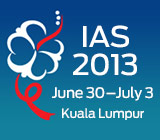 Thanks to increased competition among generic manufacturers, the price of first- and second-line antiretroviral (ARV) therapies to treat HIV have plummeted in recent years, The Associated Press reports. However, patents on newer therapies still keep those drugs’ prices heavily inflated by comparison, according to an annual report released by Médecins Sans Frontières/Doctors Without Borders (MSF) at the 7th International AIDS Society Conference on HIV Pathogenesis, Treatment and Prevention (IAS 2013) in Kuala Lumpur.
Thanks to increased competition among generic manufacturers, the price of first- and second-line antiretroviral (ARV) therapies to treat HIV have plummeted in recent years, The Associated Press reports. However, patents on newer therapies still keep those drugs’ prices heavily inflated by comparison, according to an annual report released by Médecins Sans Frontières/Doctors Without Borders (MSF) at the 7th International AIDS Society Conference on HIV Pathogenesis, Treatment and Prevention (IAS 2013) in Kuala Lumpur.
The cost of the World Health Organization’s recommended single-pill triple-combination first-line ARV has dropped 19 percent in the last year, from $172 to $139 per person per year. Some countries are able to negotiate even lower prices by ordering large quantities. Two second-line ARVs have each seen price drops of 28 percent in the past year, yielding a $303 price tag for the most affordable second-line therapy—a 75 percent reduction in overall cost since 2006.
Newer ARVs, however, are hugely expensive. The lowest price for a salvage regimen for those who have failed second-line treatment is $2,006 in the poorest nations, while countries that cannot access such cut rates pay much more. Thailand and Jamaica, for example, pay a respective $4,760 and $6,570 for the ARV Prezista (darunavir), while Paraguay must pay $7,782 for Intelence (etravirine) and Armenia’s price tag for Isentress (raltegravir) is $13,213.
“MSF and other care providers need the newer treatments for people that have exhausted all other options, but patents keep them priced beyond reach,” Jennifer Cohn, MD, medical director at MSF’s Access Campaign, said in a release. “We also need to watch carefully as newer, better medicines reach the market in coming years, as these are the drugs that we’ll quickly be needing to use. The price question is far from resolved.”
“Scaling up HIV treatment and sustaining people on treatment for life will depend on bringing the price of newer drugs down,” Arax Bozadjian, HIV pharmacist at MSF’s Access Campaign, said in a release. “Today, there are no quality-assured generic options for the large majority of the newer HIV drugs. Prices in middle-income countries are also a major concern. The terms of existing voluntary license agreements aren’t good enough; most of them don’t have terms that are public health–oriented; and most middle-income countries are excluded, which limits these countries’ access to much-needed regimens.”
To read the AP story, click here.
To read the Doctors Without Borders release, click here.
Advertisement
Advertisement
Advertisement






1 Comment
1 Comment